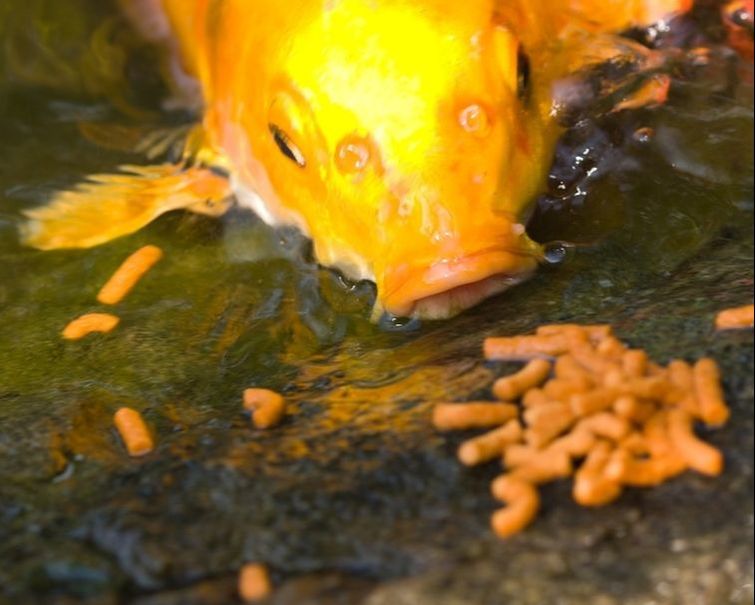
What Should I Feed My New Jersey Koi Fish, and How Often?
Feeding koi fish the right way is essential to keeping them healthy, vibrant, and happy in your pond. New Jersey’s seasonal weather requires specific adjustments to feeding practices to ensure koi get the nutrients they need all year round. Here’s a complete guide to feeding your New Jersey koi fish and helping them thrive in every season.
1. Choose High-Quality Koi Food
The quality of koi food significantly impacts their growth, coloration, and health. Look for premium koi food that lists fish meal or shrimp meal as a main ingredient, as these provide the protein koi need. High-quality pellets also contain added vitamins, minerals, and probiotics to support digestion.
Some popular options include:
- Growth Food: High in protein, ideal for warm months when koi are most active.
- Color-Enhancing Food: Contains natural color enhancers like spirulina and krill, bringing out vibrant colors in your koi.
- Cold-Weather Food: Lower in protein and high in wheat germ, making it easier to digest during cooler months.
2. Adjust Feeding with Seasonal Temperatures
New Jersey’s distinct seasons call for changes in feeding practices. Koi metabolism slows as temperatures drop, so here’s how to adjust based on the time of year:
- Spring and Fall (50–60°F): Feed koi once daily with easily digestible, wheat germ-based food. As temperatures rise, you can gradually increase protein levels.
- Summer (Above 60°F): During summer, feed koi two to three times a day. Use growth or color-enhancing food to support their active metabolism.
- Winter (Below 50°F): Koi enter a dormant state in cold water, so stop feeding when temperatures fall below 50°F. Their metabolism slows, and they won’t need additional food until spring.
3. Feed Small Amounts to Prevent Overfeeding
Overfeeding is a common issue in koi ponds and can lead to poor water quality, digestive problems, and uneaten food waste. Feed koi only what they can consume in about 5 minutes, and remove any leftover food to prevent it from decomposing in the water.
4. Supplement Diet with Natural Treats
In addition to pellet food, koi love fresh treats that add variety and essential nutrients. Treats also encourage hand-feeding, allowing you to interact with your koi and check their health. Some safe, koi-friendly treats include:
- Fruits: Watermelon, oranges, and strawberries are favorites.
- Vegetables: Lettuce, spinach, and peas provide essential fiber.
- Live or Frozen Foods: Bloodworms, shrimp, and earthworms are high in protein, ideal for summer feeding.
Offer treats sparingly to avoid disrupting their primary diet.
5. Monitor Water Quality During Feeding
Feeding practices directly affect water quality in a koi pond. Uneaten food can decompose and release nutrients that fuel algae growth and affect ammonia levels. During the warm months in New Jersey, frequent feeding and a strong filtration system help maintain water quality. Use water testing kits to monitor ammonia, nitrate, and pH levels, especially if you increase feeding in the summer.
6. Watch for Changes in Koi Behavior
Changes in appetite or feeding behavior can signal health issues or changes in water quality. If koi stop eating or seem disinterested in food, check water parameters first. Cold water, low oxygen levels, or stress can decrease their appetite. Address any water quality issues promptly to keep your koi healthy.
Final Thoughts
Feeding New Jersey koi fish the right way helps them flourish through seasonal changes, supporting their health, growth, and color. By choosing quality food, adjusting for temperature, and monitoring water quality, you can create a balanced, vibrant pond environment for your koi.
What and How Often Should I Feed the Koi in My Pond?
Does adding an automatic fish feeder help regulate feeding in Somerset County, NJ?
Yes! An automatic feeder in Somerset County ensures consistent portion control, preventing overfeeding.
Is adding high-protein food necessary for koi growth in Livingston, NJ?
Absolutely! High-protein food in Livingston promotes faster growth and vibrant koi colors.
Should I consider adding seasonal koi food in Passaic County, NJ?
Yes! Seasonal food in Passaic County helps koi adapt to temperature changes and supports their immune system.
How does adding sinking pellets benefit koi feeding in Essex County, NJ?
Sinking pellets in Essex County reduce surface competition, ensuring all koi get proper nutrition.
Want expert advice on koi nutrition and seasonal care? Contact Atlantis Water Gardens today for guidance on feeding, pond maintenance, and everything you need to keep your New Jersey koi pond thriving!
Read more information on winter pond care and tips, and videos on winter topics at these links:
Why Should New Jersey Homeowners Winterize Fountainscapes?
Can a Pond Freeze Solid in New Jersey? Essential Pond Depth Tips
How to Prepare Your Water Feature for Winter in New Jersey: Winterizing Tips You’ll Love
For more content with tips, tricks and amazing water feature goodness, check us out on YouTube!